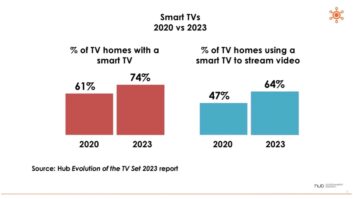Direct-to-home satellite-TV providers DirecTV and Dish Network have teamed up to fight for changes to the Satellite Home Viewer Extension and Reauthorization Act (SHVERA) — which is up for renewal shortly — that would benefit many local TV service subscribers of both services.
But broadcasters are fighting to keep the legislation the way it is, saying the changes could take local eyeballs away from the nearest stations and ruin their ratings calculations and profitability.
At issue is the satellite services’ legal ability to offer certain subscribers local TV service from within their home states.
The satellite companies point out that consumers can generally receive signals only from within their designated market area (DMA), which is a Nielsen construct used to measure advertising. For most consumers, these are their in-state channels, but many subscribers actually live closer to broadcast markets in other states.
The satellite operators argue that “no consumer has a real choice” over which they will receive.
Some local broadcasters who benefit from the existing practice are resisting the change, because they say it could hurt the amount of money the can ask advertisers to pay.
Satellite companies want the ability to offer such consumers local stations from both markets, and claim that “as many as 45 states currently have similar situations where consumers are required by law to get out-of-state TV signals.”
But some broadcasters have said they feel the best solution is to allow satellite providers to show purely local content, but then require that all other network programming be blacked out by imposing “non-duplication” rules for adjacent market signals.
The satellite companies feel that blacked out channels are impractical and not consumer friendly.
“Satellite-TV companies have a national footprint. They cannot easily black out select content in a piecemeal manner on a daily basis from hundreds of local TV stations with hundreds of different schedules covering multiple time zones. Unlike cable systems, today’s satellite infrastructure does not allow for filling in blacked out portions of the channel with alternative content. Furthermore, call-center records indicate that consumers do not like it when channels are blacked out on their screens,” DirecTV and Dish representatives said in a statement.
The satellite companies said that in many cases the stations in a viewer’s DMA are often not even the geographically closest option.
“Residents of Esmeralda County, Nev., reside 249 miles from their out-of-state ‘local’ news in Los Angeles,” a statement from the satellite companies points out. “Residents of Campbell County, Wyo., reside 339 miles from their out-of-state local news in Denver. Providing consumers with both stations offers them a complementary service, which is a win-win for everyone, including local broadcasters.”
Broadcasters also worry that the satellite companies are attempting to change the eligibility rules as a “back door” to reforming retransmission consent.
But the satellite concerns counter “that by limiting DMA reform to stranded counties (rather than entire DMAs), the broadcasters have already succeeded in ensuring that they maintain their leverage over satellite carriers in retransmission consent negotiations.”
As for broadcasters’ profit concerns, the satellite companies argue that “payment for content on fair and equitable terms is presumed by the proposed legislation. In fact, satellite and cable companies would pay broadcasters to deliver signals where they weren’t allowed to do so before — adding a new revenue stream, which could help bolster local news production.
“During the last reauthorization in 2004, Congress granted satellite companies the right to import adjacent market signals into four states (Vermont, New Hampshire, Mississippi and Oregon). None of the broadcasters in those states went out of business; the change in law did not produce the doom and gloom scenario predicted by the broadcast community.”
Broadcasting industry representatives have told Congress granting importation of adjacent-market signals to the split markets, would constitute “a free copyright license to televise the same, duplicating broadcast entertainment and sports programming that local television stations buy in the open market.
U.S. Rep. Mike Ross (D-AR) has drafted a bill that would allow all multichannel TV providers to retransmit in-state TV signals in split markets. The bill would waive the non-duplication rules in such circumstances and would not allow retransmission deals to prevent distant signal importation to adjacent underserved areas.













